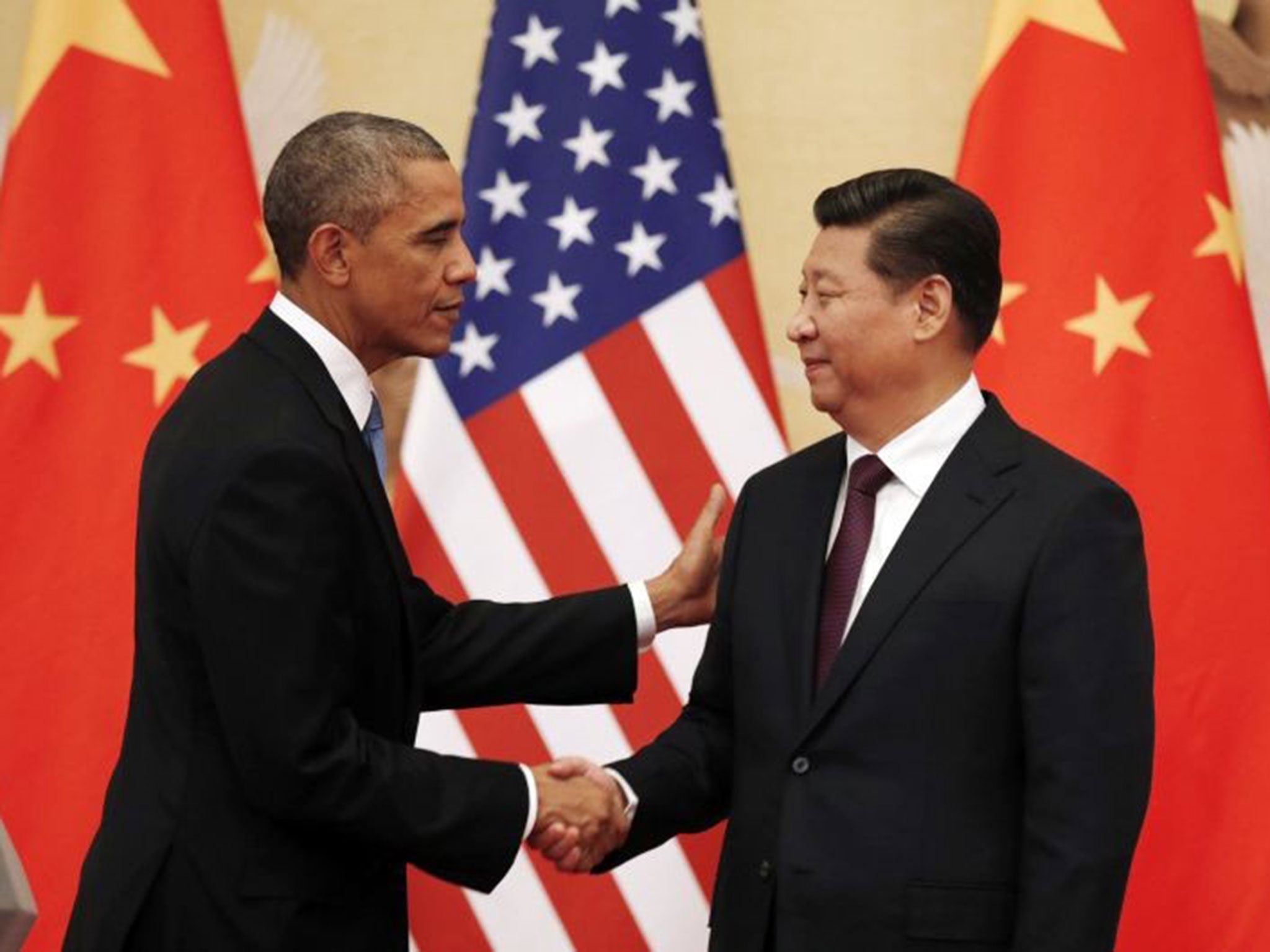The global climate change deal we've been waiting for may arrive in 2015 thanks to US diplomacy
The landmark US-China deal bodes well for next year's climate summit in Paris

Your support helps us to tell the story
From reproductive rights to climate change to Big Tech, The Independent is on the ground when the story is developing. Whether it's investigating the financials of Elon Musk's pro-Trump PAC or producing our latest documentary, 'The A Word', which shines a light on the American women fighting for reproductive rights, we know how important it is to parse out the facts from the messaging.
At such a critical moment in US history, we need reporters on the ground. Your donation allows us to keep sending journalists to speak to both sides of the story.
The Independent is trusted by Americans across the entire political spectrum. And unlike many other quality news outlets, we choose not to lock Americans out of our reporting and analysis with paywalls. We believe quality journalism should be available to everyone, paid for by those who can afford it.
Your support makes all the difference.President Barack Obama announced in Australia on Saturday that the United States would contribute some 3 billion US dollars to the Green Climate Fund. The move, which comes in the face of the Australian government’s attempts to keep climate off the G20 agenda, caps a remarkable week that has significantly increased the prospects of a new global treaty.
Obama’s move follows a major US-China announcement on Tuesday on a landmark joint climate deal. Under the deal, Washington and Beijing have announced new targets for greenhouse gas emissions that are intended to help curb global warming.
President Xi Jinping has agreed that China for the first time will set a date when its emissions would hit a peak (estimated around 2030), after which greenhouse gas emissions would fall. Meanwhile, the United States will cut net greenhouse gas emissions 26-28% below 2005 levels in the next 11 years.
Both countries will face challenges in reaching the goals. For instance Obama faces US political opposition, especially from Republicans in Congress, and is therefore likely to bypass legislators through more executive orders on climate change regulations. While this strategy is potentially viable while he remains in the White House, it could be rolled back by the next president from January 2017.
Given this congressional blockage, it is reported that Obama is ultimately seeking a ‘politically-binding’ (rather than legally-binding) UN global climate accord next year. Under this idea, states would make voluntary pledges as part of a UN deal in 2015, and then be ‘named and shamed’ if they do not subsequently take domestic climate measures to realise these cuts.
The timing of Obama’s announcement on Saturday, and the joint US-Chinese announcement on Tuesday is clearly intended to catalyse the UN-led climate talks which resume again on December 1 in Peru. The ‘top-down’ UN-led talks have been struggling to reach a breakthrough in recent years.
However, this week’s climate diplomacy reinforces the possibility that a deal can be secured, or catalysed, through a different, 'bottom-up' deal. This would be based on the growing patchwork of national regulations and laws that are emerging across the world.
While domestic challenges in some countries, including Australia and Canada, have stymied the pace of UN global climate negotiations, over 450 national climate-related laws have been passed across the world since 1997 in some 66 countries covering around 88% of global greenhouse gases released by human activities. As research from the Grantham Institute at the London School of Economics underlines, this momentum is happening across all continents in both the developed and developing world.
A clear implication is that existing domestic laws and regulations can help form the blueprint of a new global climate agreement. Indeed, it is increasingly clear that such a deal is dependent not just upon national action in place in advance, but that it will be best overseen through domestic laws and regulations, overseen by legislators from all sides of the political spectrum.
A national commitment or contribution put forward at the UN is more likely to be credible -- and durable beyond the next election -- if it is backed up by national legislation or regulation. And international best practice is for this to be supported by cross-party legislators in a way that puts in place a credible set of policies and measures to ensure effective implementation.
To be sure, a new global deal founded on national actions is only a start, not a complete panacea. As yet, the patchwork of existing domestic laws and regulations around the world are not yet enough to limit global average temperature rise to 2 degrees Celsius (3.6 degrees Fahrenheit) above pre-industrial levels, the level scientists say we must not breach if we are to avoid the worst risks of climate change.
So while national actions are putting into place the legal frameworks necessary to measure, report, verify and manage greenhouse gas emissions, even more will be needed. The ambition must therefore be that these frameworks are replicated in even more countries and ratcheted up in coming years.
Taken overall, imperfect as a global climate treaty based on national action might be, it probably represents the single most likely blueprint for success in 2015. More world leaders in the G20 and beyond should recognise this and help create what could be a key foundation stone of future global sustainable development for billions across the world.
Andrew Hammond is an Associate at LSE IDEAS at the London School of Economics, and was formerly a UK Government Special Adviser
Join our commenting forum
Join thought-provoking conversations, follow other Independent readers and see their replies
Comments